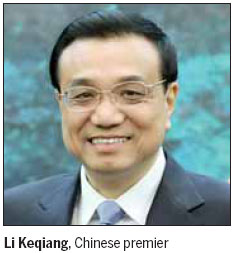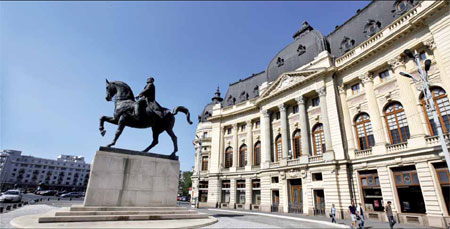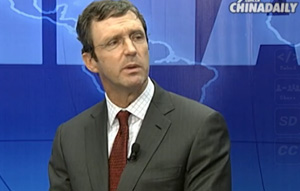China seeks new regional growth points
Updated: 2013-11-22 10:33
By Zhao Yinan and Mo Jingxi (China Daily Europe)
|
|||||||||||
Premier Li's visit to East and central Europe will also benefit west, say analysts
Chinese Premier Li Keqiang's upcoming trip to Romania and Uzbekistan is expected to explore new areas of practical cooperation with countries in the two regions and promote common development.
Li will pay an official visit to Romania from Nov 25 to 29, during which he will attend a meeting with Central and Eastern European leaders in Bucharest, the Chinese Ministry of Foreign Affairs announced.
He will also attend a prime ministers' meeting of the Shanghai Cooperation Organization (China, Kazakhstan, Kyrgyzstan, Russia, Tajikistan and Uzbekistan) in the Uzbek capital of Tashkent.
Experts say the economies of China and the Central and East European countries are highly complementary.
Ruan Zongze, vice-president of the China Institute of International Studies, says most CEE countries are, like China, changing to a market economy. They are also keen on for economic restructuring and infrastructure upgrading, while China has advantages in equipment manufacturing and infrastructure construction.
CEE countries urgently need greater investment to promote economic growth, Ruan says, and China can provide capital and technology. This has become a rallying point for cooperation, especially for business opportunities for Chinese companies.
According to the Ministry of Foreign Affairs, Li will elaborate on China's position on relations with the 16 CEE countries and announce important cooperation measures with them. He will also hold separate meetings with leaders from these countries.
Ruan says cooperation with CEE countries is in line with China's EU policy and is beneficial for the development of the EU as a whole.
"A healthy relationship and cooperation between China and CEE countries will benefit the regional economy of Central and Eastern Europe and hence contribute to the revitalization of Europe," he says.
In recent years, China has set up a secretariat for multilateral exchanges, while CEE countries have each designated a department or a national coordinator to work with the secretariat. The sides have made progress in trade and investment since the first China-CEE business forum was held in Budapest in June 2011.
During Li's stay in Romania, he will meet top leaders of the country and give a speech at the parliament.
Analysts believe the visit, the first by a Chinese premier in nearly 20 years, will add impetus to the two countries' traditional friendship and practical cooperation.
Located in the northeast of the Balkan Peninsula, Romania is the eastern gate to the EU, which it joined in 2007 as a full member.
Feng Zhongping, vice-president of the Chinese Institute of Contemporary International Relations, says Romania has adopted a balanced policy in foreign relations, attaching equal importance to relations with Western countries and with China.
Romania is eager to intensify economic cooperation with other countries, especially China, Feng says, and sound political relations between the two countries have laid a solid foundation for this.
Romanian Prime Minister Victor Ponta said earlier this year that China's development could benefit the world, and his country was willing to be China's best partner in Europe and play a positive role in promoting China-CEE cooperation and China-EU relations.
At the SCO prime ministers' meeting in Tashkent, Li will meet with prime ministers of other SCO member states and sign a series of documents to further implement the consensus on practical cooperation reached at the SCO summit in the Kyrgyz capital of Bishkek earlier this year.

Gao Yusheng, China's former ambassador to Uzbekistan, says the two tasks for the meeting are to implement the Bishkek consensus and to improve interconnectivity in transport, energy and telecommunications.
But Vice-Foreign Minister Cheng Guoping says he expects greater anti-terrorism cooperation will become the most pressing task.
With the withdrawal of US troops and a presidential election in Afghanistan next year, Cheng says the SCO states and all parties concerned will discuss strengthening cooperation to combat the "three evil forces" of terrorism, separatism and extremism, especially those of the East Turkistan Islamic Movement.
"Especially in closed-door meetings, leaders will exchange detailed views on anti-terrorism cooperation," Cheng says.
Anti-terrorism measures were brought to the fore last month, when two people were killed and another 40 injured on Oct 28 after a jeep, driven by Usmen Hasan and carrying his mother and wife from Xinjiang Uygur autonomous region, crashed into a crowd at Tian'anmen Square in Beijing. Police later confirmed the incident as a terrorist attack and detained five suspects.
Meng Jianzhu, chief of the Commission for Political and Legal Affairs of the Communist Party of China Central Committee, told the executive committee of the Regional Counter-Terrorism Structure earlier this month that the East Turkistan Islamic Movement, one of four terrorist organizations connected with the region, was behind the terror attack.
The ETIM is listed as a terrorist organization by the United States and the United Nations.
Chen Yurong, a senior researcher at the China Institute of International Studies, says the terrorist campaigns pose a threat to the security of SCO member states.
"The three evil forces have been brought under control since the establishment of the organization (SCO), especially after the 9-11 attack in the US," she says. "However, they have regained vigor given the current situation in Afghanistan. So it becomes an urgent task for the SCO member states to increase concerted efforts to fight terrorism.
"They should exchange information more effectively and have closer communications about it. Terrorism harms the lives and interests of the ordinary people and has a direct impact on the economic development of the member states."
Since it was founded in 2001 in Shanghai, the SCO has become a strategic pillar for the region to maintain security and develop the economy as a whole.
The organization has made great headway in confronting terrorism, separatism and extremism as well as fighting smuggling and cross-border crimes.
Contact the writers at zhaoyinan@chinadaily.com.cn and mojingxi@chinadaily.com.cn
|
The Central University Library Carol I in Bucharest, Romania. Chinese Premier Li Keqiang will pay an official visit to Romania this month. Provided to China Daily |
(China Daily European Weekly 11/22/2013 page3)
Today's Top News
Premier Li heads west on opening-up tour
Deal reached in Iranian nuke talks
Roar of the East being heard
New air zone in line with practice
UN talks agree on major principles for climate pact
China maps out air defense ID zone
Nokia has 'phab' plan for Chinese mobile market
Newtown investigation report to be released
Hot Topics
Lunar probe , China growth forecasts, Emission rules get tougher, China seen through 'colored lens', International board,
Editor's Picks

|

|

|

|

|

|






